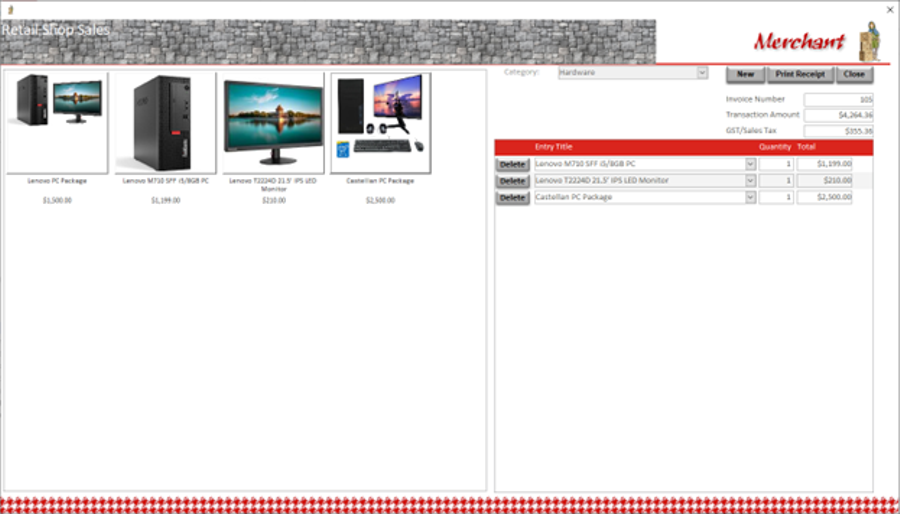



|
A “Merchant” is a person who trades in commodities produced by other people, especially one who trades with foreign countries. Historically, a merchant is anyone who is involved in business or trade. Merchants have operated for as long as industry, commerce, and trade have existed. In 16th-century Europe, two different terms for merchants emerged: meerseniers referred to local traders (such as bakers and grocers) and koopman referred to merchants who operated on a global stage, importing and exporting goods over vast distances and offering added-value services such as credit and finance. Merchant is a Supply Chain Management application. Supply chain management systems span the activities of procurement, product lifecycle management, supply chain planning (including inventory planning and the maintenance of enterprise assets and production lines), logistics (including transportation and fleet management), and order management. Merchant is a partner application to our Employee Management Systems (EMS), Chancellor. It's been developed to work along side Version 4.0, or later, of Chancellor and together form a strong ERP solution for any retail business. |
|
|
|
|
| Version 1.7 now provides retail shop sales support. The licensing model has been changed from “User” to “Terminal”. The “Terminal” licensing model licenses the workstations where the application is installed, instead of every individual user. | |
|
So what does Merchant do? |
|
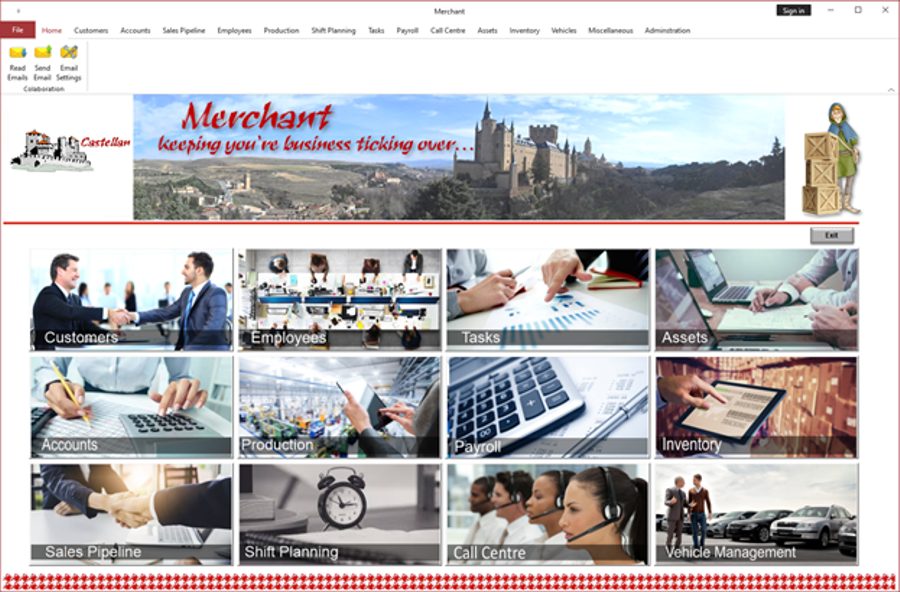 |
Merchant manages your customer records including products purchased and installation and registration codes. It provides a full set of Accounting facilities. It manages your Sales Pipeline. It provides Production Management facilities including purchasing, manufacturing, stock and inventory management, and Sales. It manages your work tasks. It records your payroll expenses. It provides Call Centre Management facilities. It manages vehicle usage and expenses. It manages the organisation’s employee details records. It assists the preparation of shift staff allocation by defining shift and providing facility to allocate staff to the various roles in a shift. It provides full support for the management of assets and prints asset labels which include a barcode. It provides support for the management of staff expenses. It allows for the recording of timesheets which can then be submitted to the employee’s manager for review and approval. It allows managers to review and approve/reject timesheets or individual entries. Merchant maintains units of measurement (UOM), types of leave and public holidays that are used by the rest of the application. |
|
Merchant maintains your employee’s details including their personal details, manager, next of kin, a photo, email address and network user id, employment details, remuneration details. It stores any documents, like resumes as attachments. It can record the different positions the employee has held with the organisation; any payroll additional allowances or any deductions applicable to the employee; the banking details to use by payroll for the employee; the superannuation, if applicable, account(s) details to use by payroll for the employee; and general notes. You can save a photo of the employee and generate a unique id for that employee. The barcode generated used the common Code 39 barcode type used for various labels such as name badges, inventory and industrial applications. The symbology of the Code 39 character set consists of barcode symbols representing numbers 0-9, upper-case letters A-Z, the space character and the following symbols: – . $ / + %. Lower-case characters may also be used. The photo and barcode will appear on the employee’s ID card when produced. It can generate an employees address book and phone list. |
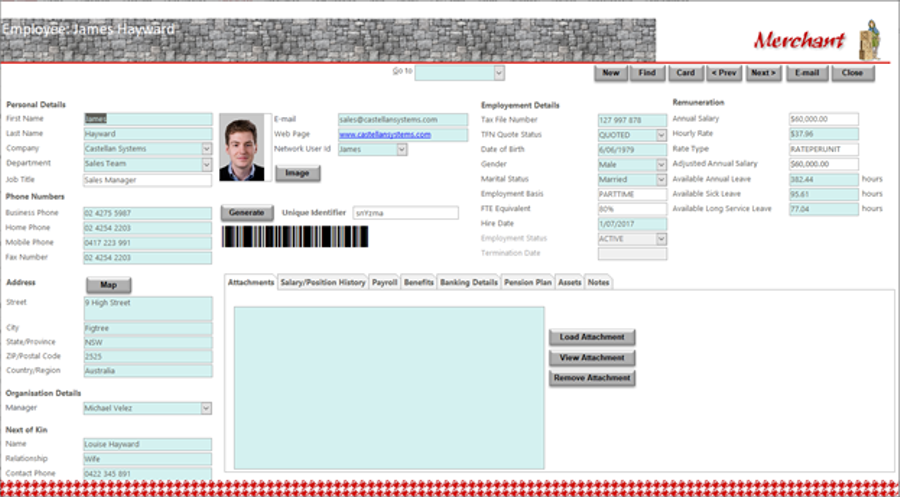 |
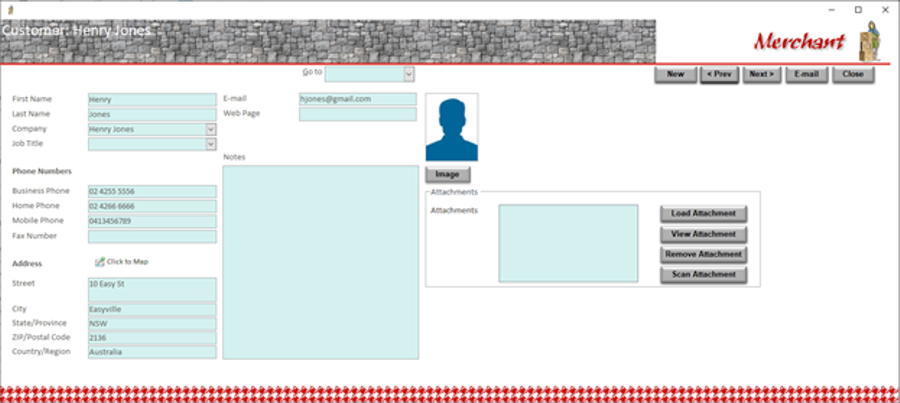 |
Merchant maintains your customer’s details including their personal details, a photo, email address and mailing address. It stores any documents. Merchant records and maintains the list of products your customers have purchased, including installation and registration codes where applicable (e.g. software packages). It can support an upgrade and subscription service for each product and assist in notifying your customers when new versions are available or their subscription has expired. |
|
Merchant provides accounting/financial report to support the financial administration of the organisation. Most of these reports can be viewed on an enquiry screen, generated as a PDF or printed out. These reports include:
Obviously, these reports are generated using the expenses and income data recorded throughout the application, which is recorded using classes and categories to support the financial reporting. |
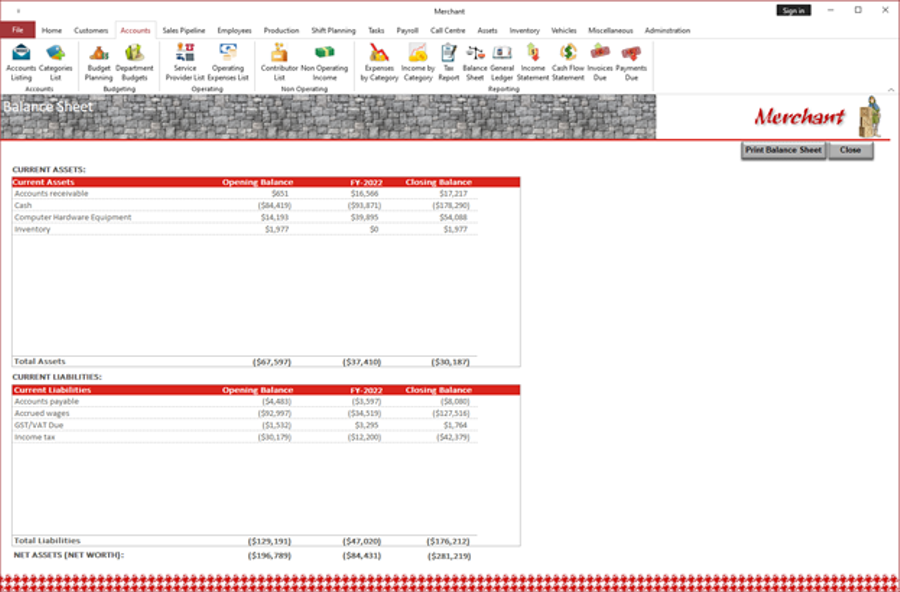 |
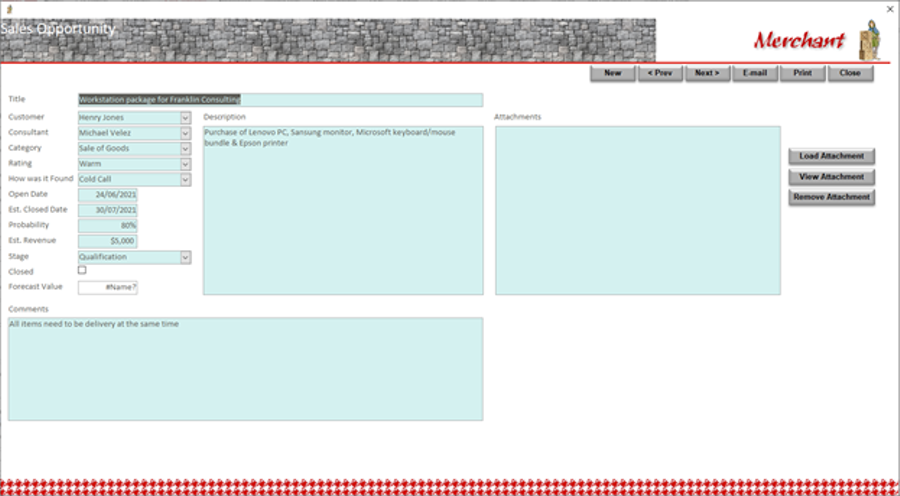 |
Merchant supports your sales pipeline process by tracking opportunities and providing various enquiry facilities to analyse the pipeline. These sales opportunities can then initiate a quote or completely new quotes can be recorded/produced. A quote can then initiate a sale from which an invoice can be generated. Merchant allows for the barcode generated by Merchant either in the product catalogue or on the individual item, to be scanned in order to record the items included in the quote. |
|
Merchant support the product inventory process by defining products the organisation has available for sales. Products can be flagged temporarily unavailable. These products could be simply items purchased from a supplier and then onsell, or products manufactured using purchased items from suppliers. Merchant also support products which you sell that need to be uniquely identified by a serial number. In the case of purchased items, the manufacturer's serial number is used; in the case of items the organisation manufactures, a unique serial number is generated using the product category. Merchant allows for item delivered by the vendor damaged or unusable, to be return back to the vendor for a refund. It also allows for spoilt, damaged or unusable items in the inventory to be disposed at a loss. |
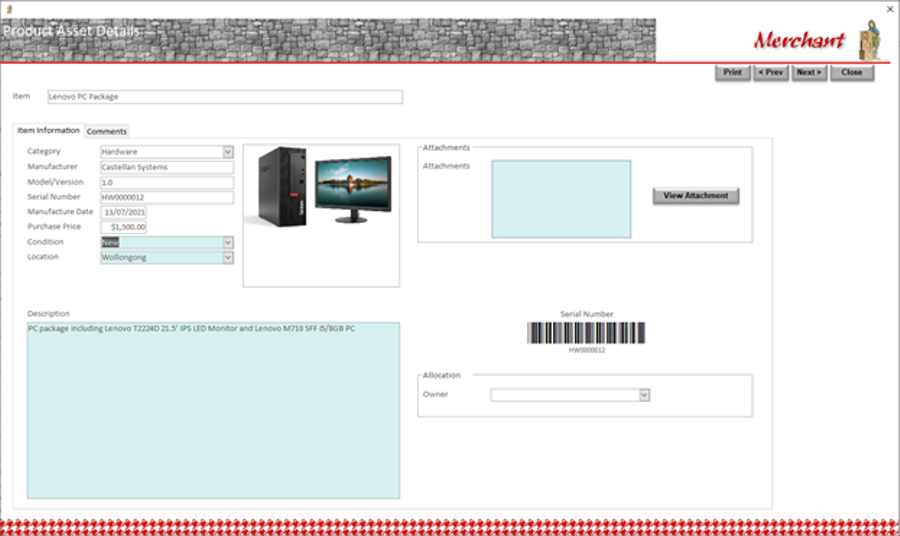 |
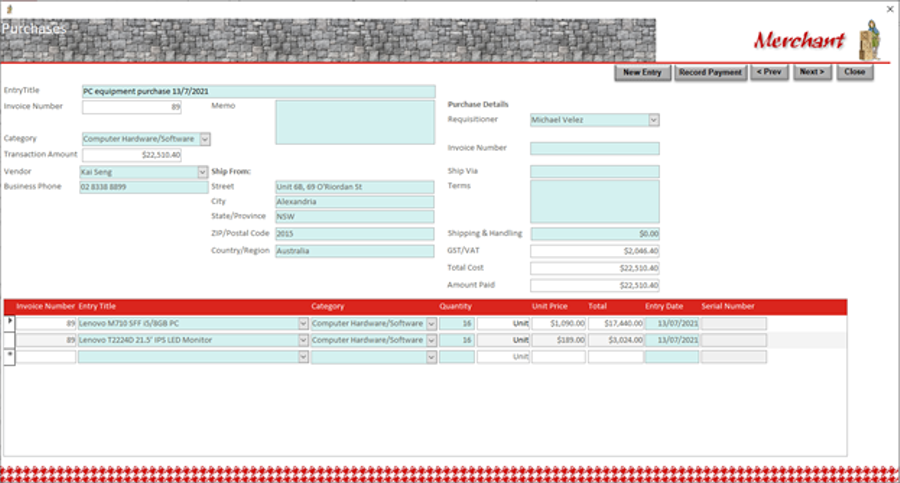 |
Merchant supports the purchasing process for raw materials, and warehousing, to support the manufacturing process. It can maintain warehouses of available items and manage re-stocking. It maintains a list of suppliers and the items they supply. It can issue purchasing orders and maintains an inventory of these. As items are either sold or used to in the manufacturing process, it updates the inventory so that the current available stock of any item is known. You can view at any time the purchase transactions and inventory transactions. Merchant can print a report which items require re-ordering to maintain the stock levels preferred. It can produce many reports that assist in analysing the inventory. It can also print a Suppliers Directory listing every supplier and the items they provide; this can be used as an easy reference when ordering new stock. |
|
Merchant supports the manufacturing process by recording details of production batches; it records how many items were manufactured, calculates the raw materials consumed and updates the inventory accordingly; both for the consumed items and manufactured items. If the manufactured items need to be uniquely identified, a unique serial number is generated using the product category. Merchant accordingly maintains an inventory of manufactured items so that the organisation always knows how much stock it has available for sale and to determine when and how much it need to manufacture to meet its orders. |
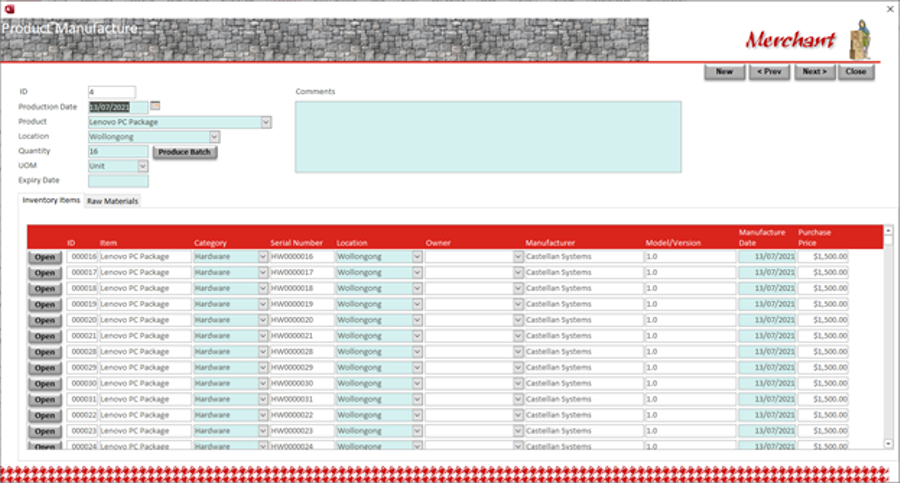 |
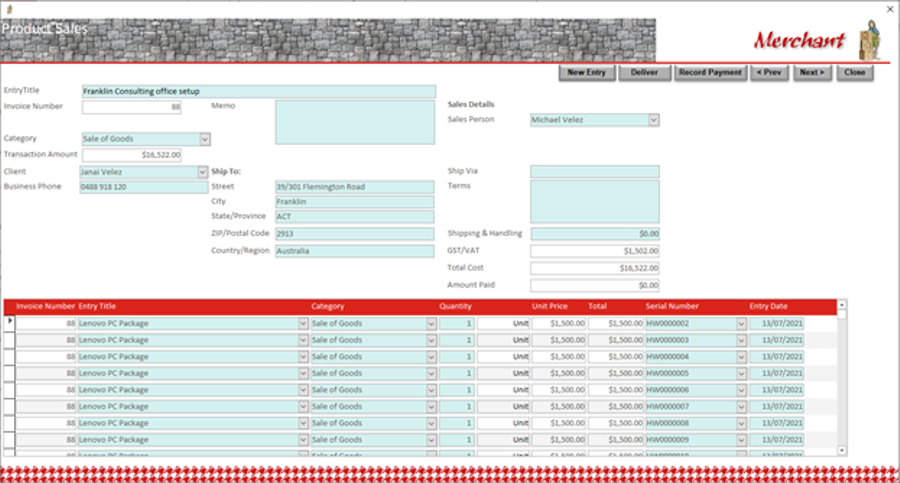 |
Merchant support the organisation's sales activities by recording customer orders and then following through to an actual sale and payment. For uniquely identified items, the owner is recorded in the inventory and the overall inventory is updated with reduction of stock. Merchant allows for the barcode generated by Merchant either in the product catalogue or on the individual item, to be scanned in order to record the items included in the quote. Merchant can produce customer fully itemised invoices. In order to support the whole purchasing -> manufacturing -> sales process, Merchant produces various reports reporting on various aspects of the stocking process. |
|
|
|
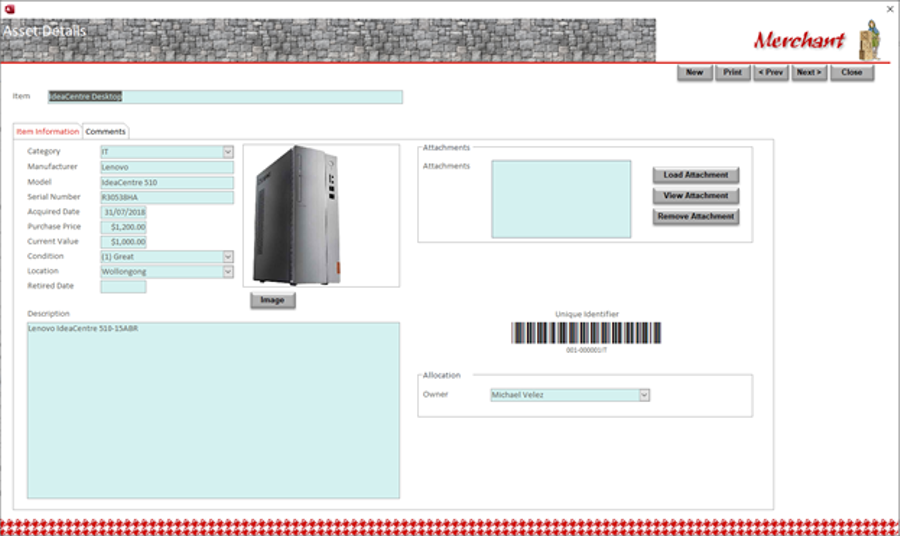 |
Merchant provides facilities for asset management. It can define asset types and location where these assets are kept. It can register assets, including a description, photo, manufacturer, model, serial number and store any documents, like brochures. It can generate identifying barcodes and print asset label which are then attached to the assets. It can allocate assets to staff and monitor their return when the staff member terminates their employment with the organisation. It provides multiple reports to support monitoring and managing of these assets. |
|
Merchant support the generation of shift resourcing plans. Shifts and the different roles/jobs within these shifts can be defined. Plans can be put together in a graphical calendar representation which can also be printed and distributed to staff. Merchant reviews each resourcing selection to ensure that a staff member has no overlapping shift. It also ensures that a staff member is not allocated to shifts without a normal shift gap in between, i.e. no 2 shifts in a row, in order to manage staff fatigue. |
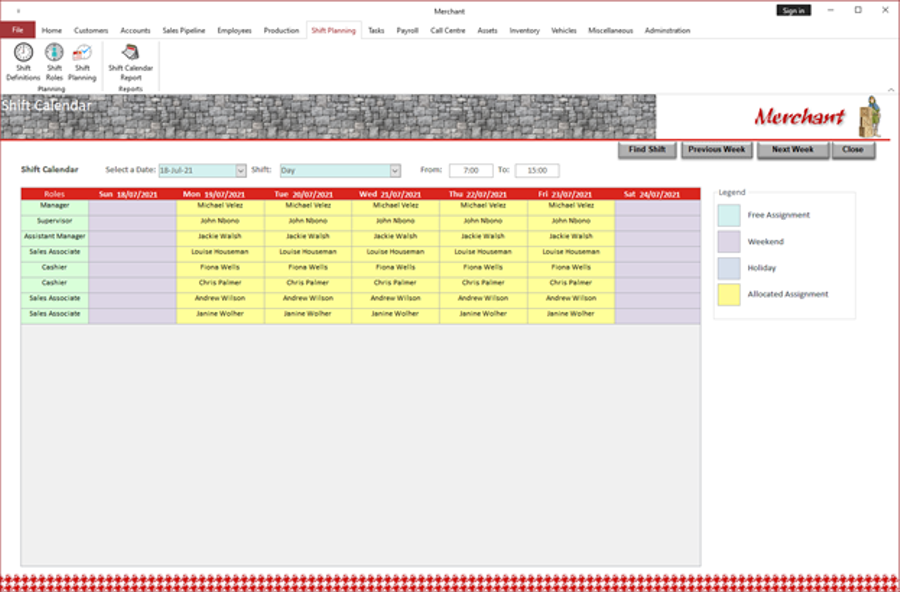 |
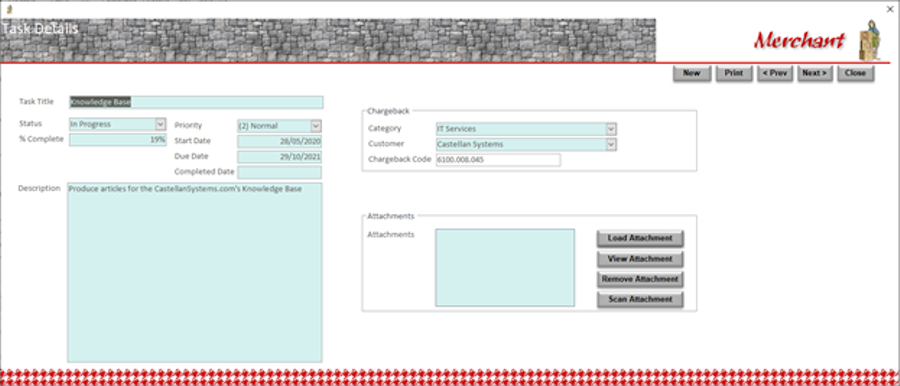 |
Merchant provides facilities to support task management. These tasks can represent work tasks defined by managers or projects contracted with customers. These tasks are then available for staff in the timesheet recording facility. Various reports are also provided to manage these tasks. |
|
Merchant allows staff to make claims for refunds of working expenses. These claims can take one of two forms: mileage claims for travel or cash expenses; for cash expenses the staff member can attach supporting documentation, including receipts and invoices. Merchant supports the scanning of these attachment through a TWAIN compliant scanner. The staff member submits the claim and it's then sent to their manager for review and approval. It provides multiple reports to support monitoring and managing of these claims. |
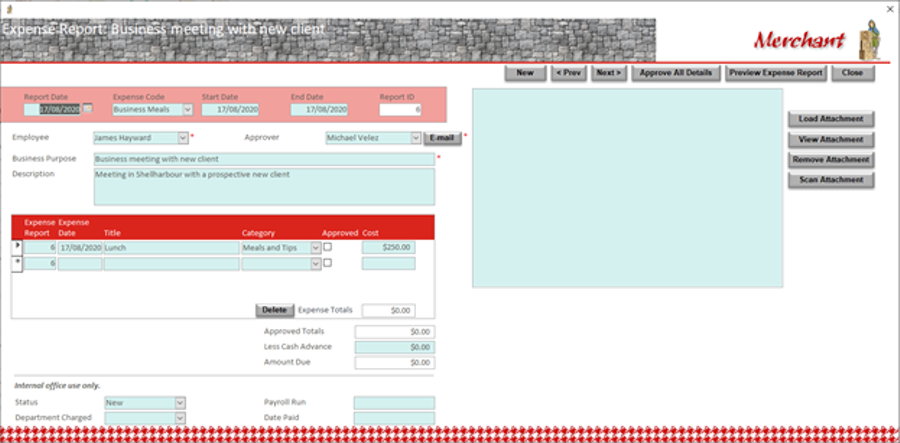 |
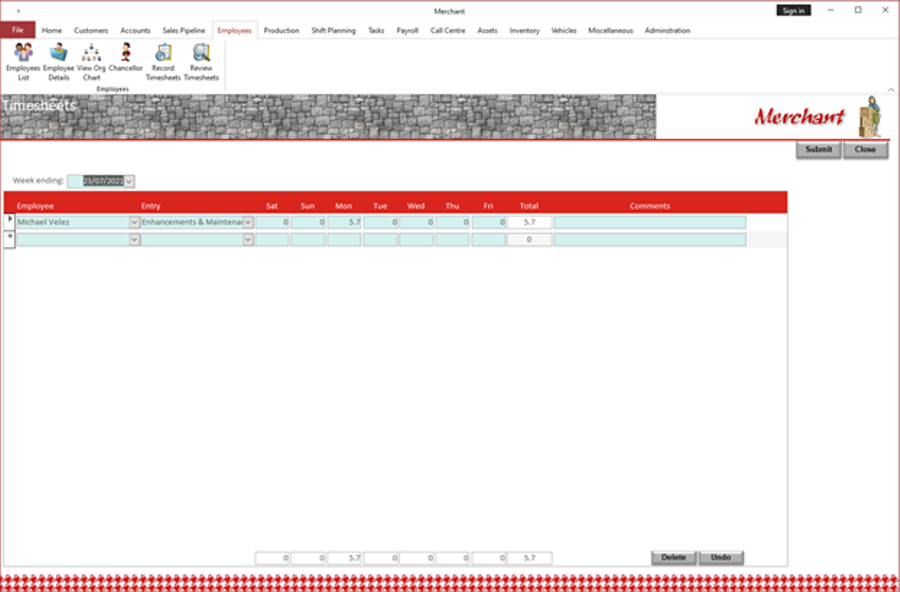 |
Merchant can record an employee's timesheet and it can be submitted for review and approval.
Merchant provides 2 options for timesheet recording:
The timesheet data is then used, along with the employees' salary package information, to calculate payroll costs and update the organisation's balance sheet. |
|
Merchant, as mentioned above, uses the timesheet data recorded, and approved, by staff to calculate payroll costs. It also uses the staff's salary package information to calculate payroll costs. These costs are then added to the balance sheet so that a full picture of the financial state of the organisation can be viewed. Merchant can also import a payroll expenses report from your payroll solution; for that purpose a sample layout Excel (.xls) file is included so that the format of this file can be identified.
|
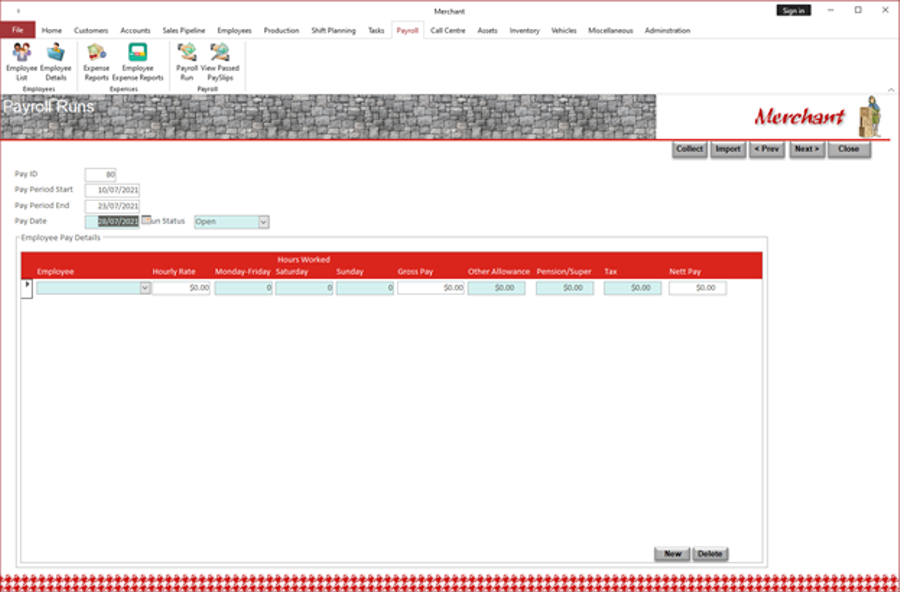 |
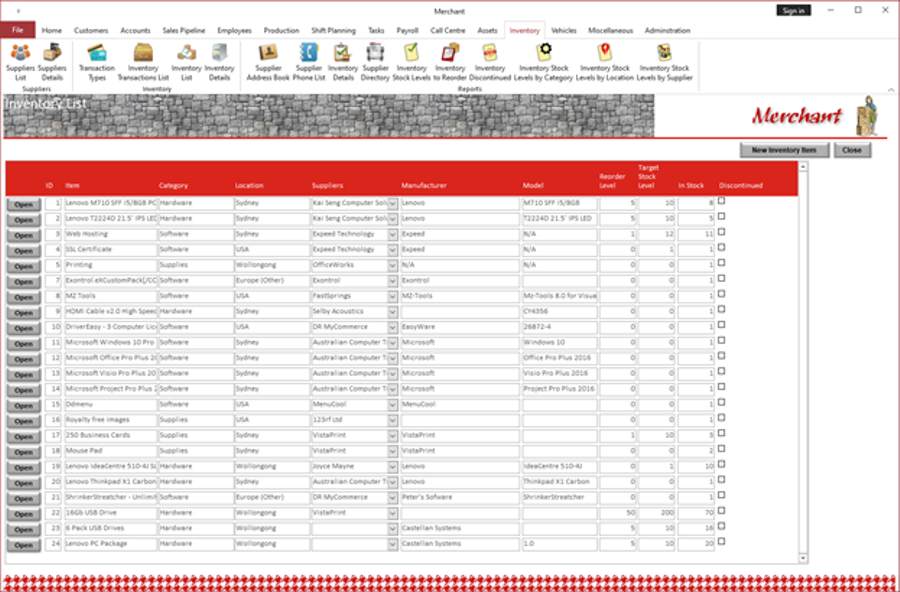 |
Merchant, as already mentioned, supports the operation of stores and warehouses within the organisation. It can maintain stores of available items and manage re-stocking. It maintains a list of suppliers and the items they supply. It can issue purchasing orders and maintains an inventory of these. It can receive requests for items and fill them and update the inventory so that the current available stock of any item is known. You can view at any time the purchase transactions and inventory transactions. Merchant can print a report which items require re-ordering to maintain the stock levels preferred. It can produce many reports that assist in analysing the inventory. It can also print a Suppliers Directory listing every supplier and the items they provide; this can be used as an easy reference when ordering new stock. |
|
Merchant also provides call centre facilities. Calls from customer with issues or queries can be logged and assigned to individual staff the address. If multiple calls are made relating to the same issue, these can be linked. The response to these calls can be recorded and information emailed to the caller. Merchant maintains a knowledge base of known responses so that they can easily be referenced and the issue resolved quicker. |
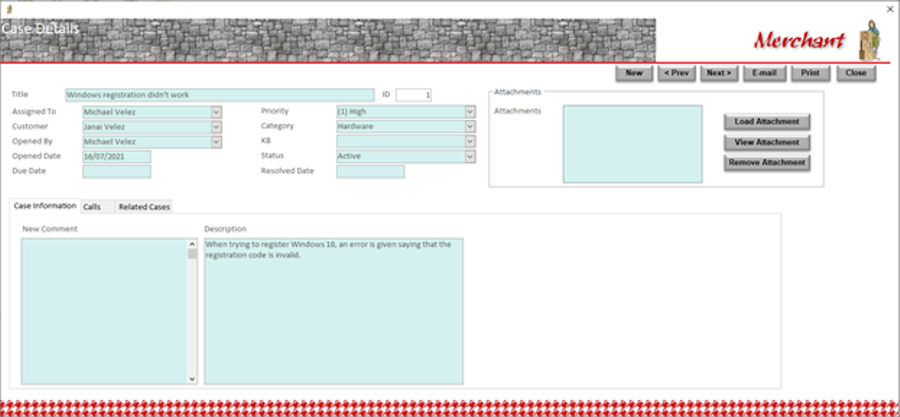 |
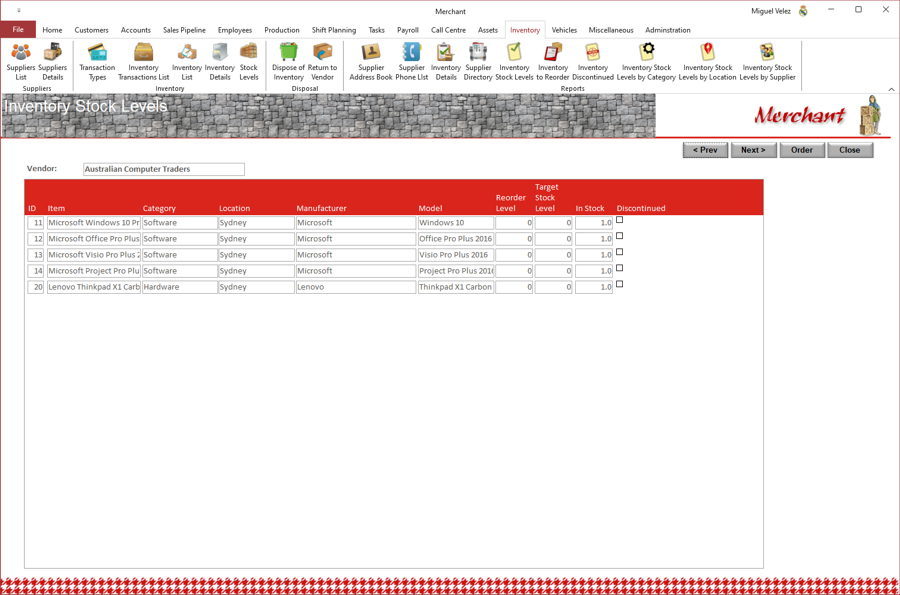 |
Merchant now has improved stock levels monitoring and can generated re-ordering purchasing order semi-automatically. It will enquire to identify those stock items below the desired level and generate purchase orders for them which can be reviewed and modified by the user, if required. |
|
Merchant supports fleet or vehicle management. It can record details of the vehicles managed by the organisation. It can also record details of authorised staff owned vehicles that can be used for business purposes. Merchant can records trips undertaken by staff in these vehicles for business purposes and then process refunding of costs to staff. These costs are also added to the organisation's balance sheet. |
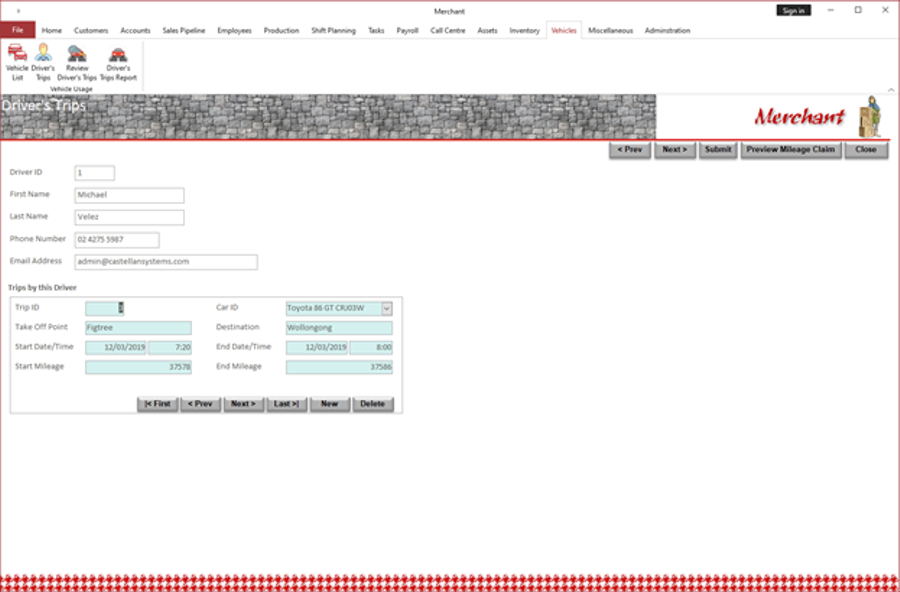 |
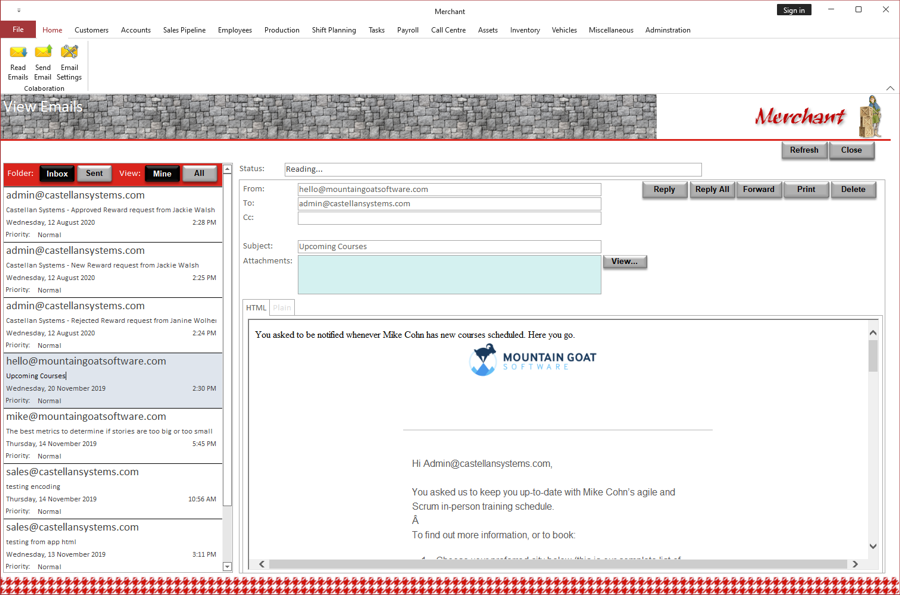 |
Merchant provides inbuilt Emailing facilities. Emails can be imported from your Email Server without the need for an Email client like Microsoft Outlook. These Emails are then stored within the database along with any attached documents. Emails can be printed. |
|
Merchant can also send Emails through your Email Server without the need for an Email client like Microsoft Outlook. These Emails are then stored within the database. |
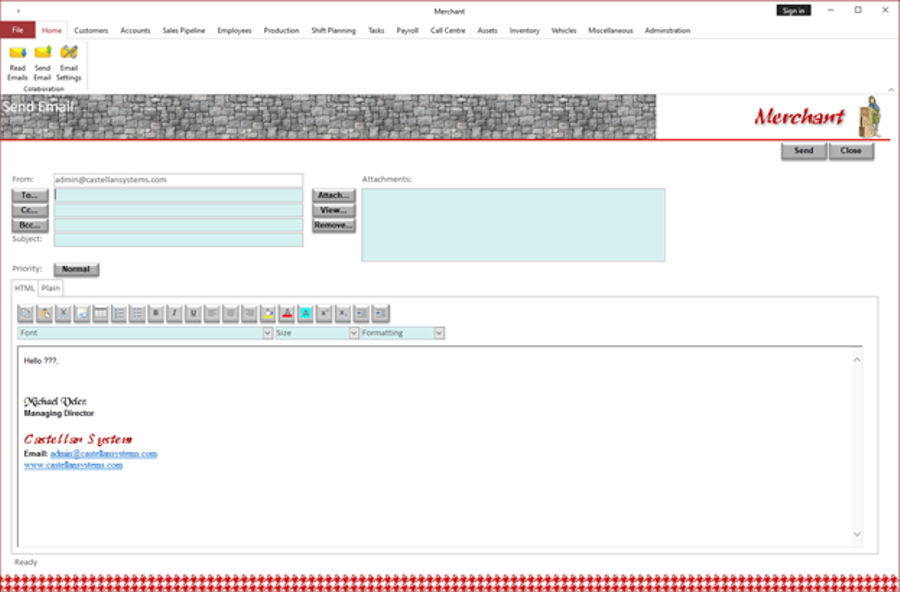 |
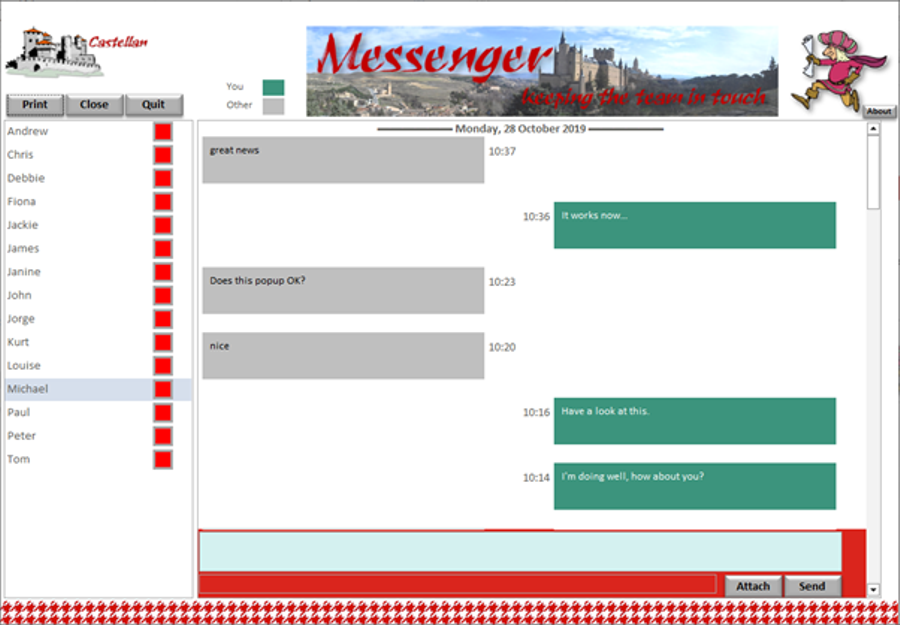 |
The Merchant package includes Messenger, our Instant Messaging tool. This tool can be distributed to all employees no matter the licenses of Merchant have been purchased. It’s use to communicate with each other in a fast and simple manner. And what's more important, this application is free; purchase licenses for the use to the full Merchant application and then you can distributed this application to all other staff members. |
|
While the main Chancellor application is for use by staff directly involved in the business processes covered by Chancellor, we also provide a supporting application, Chancellor Employee Portal. This application is for all other staff members and allows then to perform the functions that they require, like:
And what's more important, this application is free; purchase licenses for the use to the full Chancellor application and then you can distributed this portal application to all other staff members. |
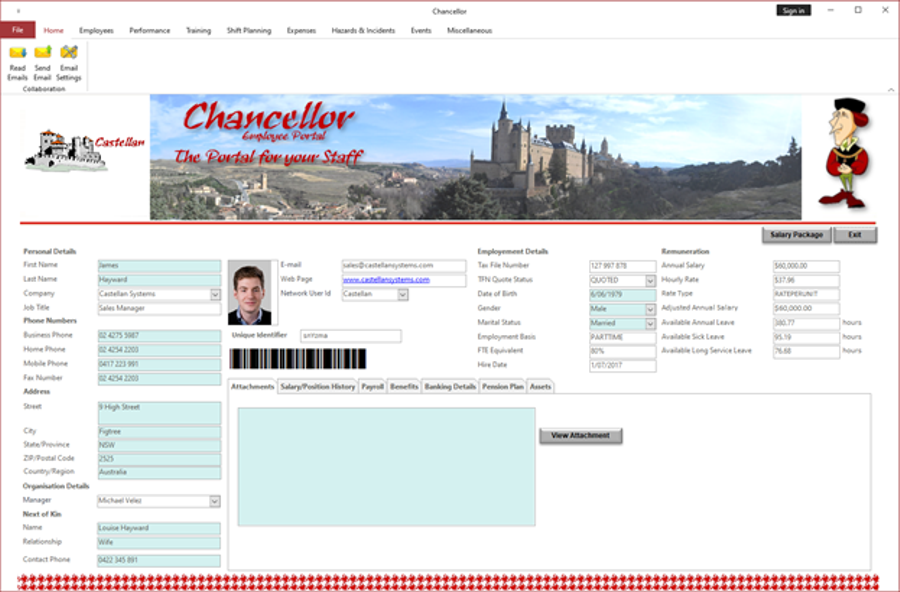 |
|
Merchant is available in 5, 10 and 20 user licenses; but we're happy to negotiate any other arrangement. Just contact us. Please Note: You only have to purchase Merchant licenses for staff engaged in business processes covered by the application. You can then distribute the Messenger application to all other staff members and allows then to instantly communicated with each other. |
|
